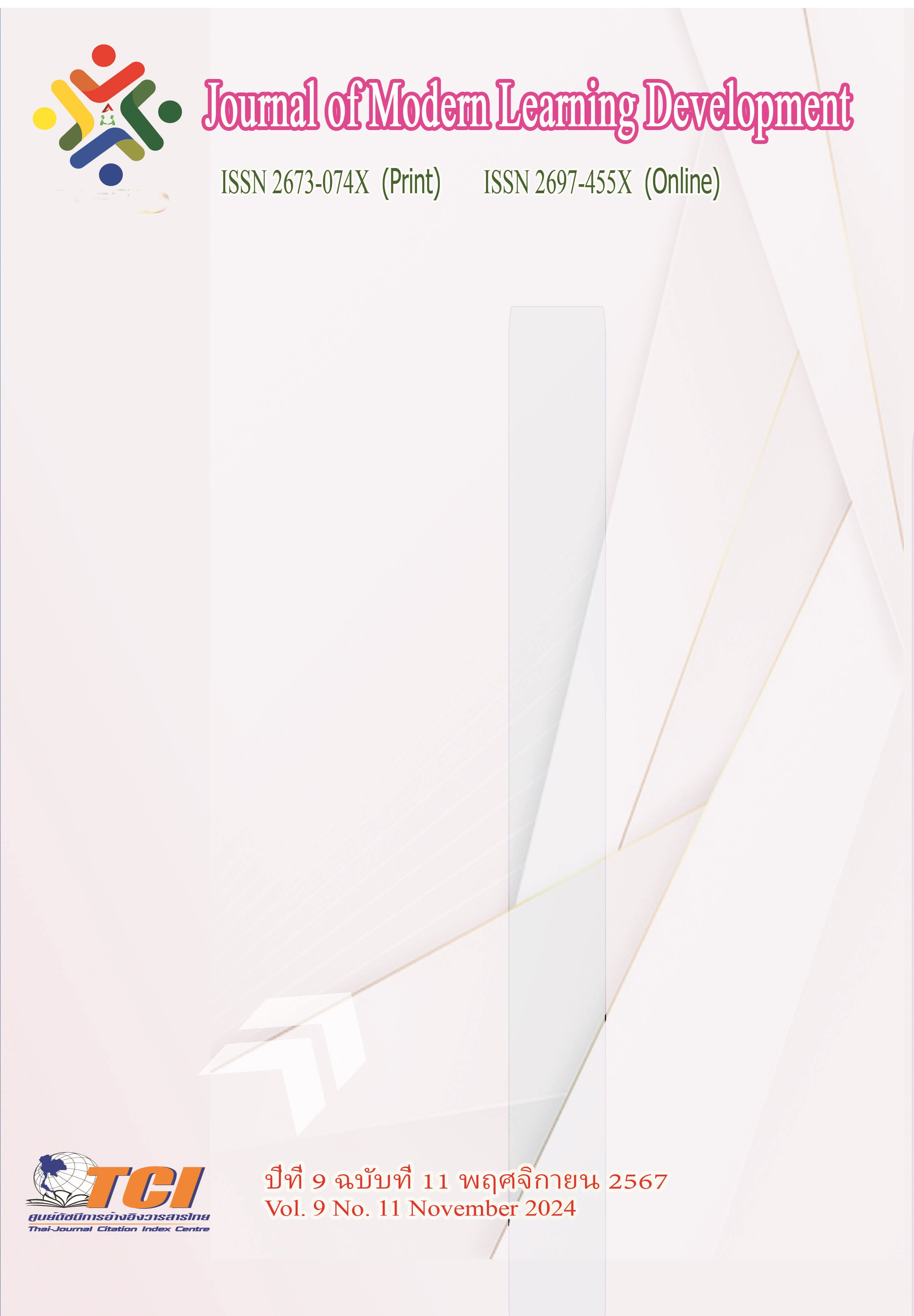Travel Anxiety and Travel Intentions of Domestic Tourist in Thailand in Next Normal after the New Pandemic
Main Article Content
Abstract
The purposes of this research are as follows: 1) to compare the personal characteristics related to chronic disease status with travel anxiety and travel intentions of domestic tourists in Thailand in next normal after the new pandemic, 2) to investigate the relationship between travel anxiety and travel intention of domestic tourists in Thailand in next normal after the new pandemic using quantitative research methods. A questionnaire was used to collect the data from a sample of 421 Thai individuals through convenient sampling. Statistical analysis methods employed include frequency, mean, percentage, standard deviation, t-test, and One-way ANOVA.
The research findings revealed that different personal characteristics related to chronic disease status yield different levels of travel anxiety. The correlational analysis revealed that travel anxiety is correlated with travel intention among domestic tourists (r = .112, p < .05). Research suggests that government or private sector agencies involved must strictly implement health and safety measures, especially in densely populated tourist destinations, to build confidence in traveling. This is because tourists with congenital diseases and those with family members who have congenital diseases are still concerned about traveling.
Article Details
References
ถิตรัตน์ พิมพาภรณ์ และ วีระยุทธ พิมพาภรณ์. (2565). พฤติกรรมการใช้อินเทอร์เน็ตและการรับรู้ข้อมูลการท่องเที่ยวจากสื่อดิจิทัล ต่อความตั้งใจเดินทางท่องเที่ยว ในบทบาทของความเชื่อมั่นในข้อมูลทางอินเทอร์เน็ต. วารสารสหวิทยาการสังคมศาสตร์และการสื่อสาร. 5 (1), 50-60.
บุญชม ศรีสะอาด. (2545). การวิจัยเบื้องต้น. (พิมพ์ครั้งที่ 7). กรุงเทพมหานคร: สุวีริยาสาส์น.
บริสุทธิ์ แสนคำ. (2564). พฤติกรรมการท่องเที่ยวของนักท่องเที่ยวชาวไทยหลังสถานการณ์โควิด 19. วารสารศิลปศาสตร์และอุตสาหกรรมบริการ. 4 (1), 160-167.
ผู้จัดการออนไลน์. (2024). ฉลองสงกรานต์อย่างเป็นสุข อย่าต้องทุกข์เพราะนำเชื้อโควิด-19 สู่ผู้สูงวัยที่รัก. ออนไลน์. สืบค้นเมื่อ 30 พฤษภาคม 2567. แหล่งที่มา https://mgronline.com/onlinesection /detail/9670000032110
พรรณรศา ธีระวงศ์สกุล. (2565). Trending in Travel สถานการณ์การเดินทางท่องเที่ยวโลก. ออนไลน์. สืบค้นเมื่อ 30 พฤษภาคม 2567. แหล่งที่มา https://tatreviewmagazine.com/article/trending-in-travel/.
วิภาดา เถาธรรมพิทักษ์, สิปปวิชญ์ วงศ์สุวัฒน์ และ ศิริกัญญา ทองเส้ง. (2566). พฤติกรรมการท่องเที่ยว ความกังวลในการเดินทางท่องเที่ยว การรับรู้ผ่านการสื่อสารแบบปากต่อปากบนเครือข่ายอินเทอร์เน็ต และความตั้งใจเดินทางท่องเที่ยวภายหลังการแพร่ระบาดของโควิด 19 ของนักท่องเที่ยวชาวมุสลิม. วารสารการบริการและการท่องเที่ยวไทย. 18 (1), 56-68.
ศูนย์วิเคราะห์เศรษฐกิจ ttb analytics. (2567). มองรายได้การท่องเที่ยวปี 2567. ออนไลน์. สืบค้นเมื่อ 30 พฤษภาคม 2567. แหล่งที่มา :https://www.ttbbank.com/th/analytics/business-industry/ tourism-healthcare/20240111-ttb-รายได้ท่องเที่ยวปี-2567.
ศุภัตรา ฮวบเจริญ และนันทินี ทองอร. (2565). แนวทางการสร้างความเชื่อมั่นต่อการท่องเที่ยวในภาวะวิกฤตโรคระบาด. วารสารการบริการและการท่องเที่ยวไทย. 17 (1), 46-59.
Allen, M. S., Walter, E. E., & Swann, C. (2019). Sedentary behaviour and risk of anxiety: a systematic review and meta-analysis. Journal of Affective Disorders, 242, 5-13.
Beerli, A., & Martin, J. D. (2004). Factors influencing destination image. Annals of tourism research, 31 (3), 657-681.
Gudykunst, W. B., & Hammer, M. R. (1988). The influence of social identity and intimacy of interethnic relationships on uncertainty reduction processes. Human Communication Research, 14 (4), 569–601.
Jang, S., Bai, B., Hu, C. and Wu, C. (2009). “Affect, travel motivation, and travel intention: a senior market”. Journal of Hospitality & Tourism Research, 33 (1), 51-73.
Jovičić Vuković, A., Terzić, A., Gašević, D., Tomašević, D., & Mikulić, J. (2022). Travel intentions in pandemic circumstances – the case of Balkan tourists. Economic Research-Ekonomska Istraživanja, 36 (2).
Luo, J. M., & Lam, C. F. (2020). Travel anxiety, risk attitude and travel intentions towards “travel bubble” destinations in Hong Kong: Effect of the fear of COVID-19. International journal of environmental research and public health, 17 (21), 7859.
Magano, J., Vidal, D. G., Dinis, M. A. P. & Leite, Â. (2021). Validation and psychometric properties of the portuguese version of the coronavirus anxiety scale (CAS) and fear of COVID-19 scale (FCV19S) and associations with travel, tourism and hospitality. International Journal of Environmental Research and Public Health, 18 (2), 427.
McCartney, G. (2020). The impact of the coronavirus outbreak on Macao. From tourism lockdown to tourism recovery. Current Issues in Tourism, 24 (19), 2683–2692.
McIntyre, N., & Roggenbuck, J. W. (1998). Nature/person transactions during an outdoor adventure experience: A multi-phasic analysis. Journal of Leisure Research, 30 (4), 401-422.
Mindell, J. S., & Curl, A. (2024). Interactions between health and travel behaviour. In Handbook of Travel Behaviour (pp. 389-411). Edward Elgar Publishing.
Nazneen, S., Hong, X. & Ud Din, N. (2020). COVID-19 crises and tourist travel risk perceptions. SSRN Electronic Journal, May (4), 2020.
Qiu, J., Shen, B., Zhao, M., Wang, Z., Xie, B., & Xu, Y. (2020). A nationwide survey of psychological distress among Chinese people in the COVID-19 epidemic: implications and policy recommendations. General psychiatry, 33 (2).
Rovinelli, R. J., & Hambleton, R. K. (1977). On the use of content specialists in the assessment of criterion-referenced test item validity. Tijdschrift voor Onderwijsresearch, 2 (2), 49–60.
Şengel, Ü., Genç, G., Işkın, M., Çevrimkaya, M., Zengin, B., & Sarıışık, M. (2022). The impact of anxiety levels on destination visit intention in the context of COVID-19: the mediating role of travel intention. Journal of Hospitality and Tourism Insights, 6 (2), 697-715.
World Health Oganization. (2020). Coronavirus disease (Covid-19) pandemic. Advice for the public. Online. Retrieved July 10, 2024. from: https://www.who.int/emergencies /diseases/novel-coronavirus-2019/advice-for-public.
Williams, C. C., & Kayaoglu, A. (2020). COVID-19 and undeclared work: Impacts and policy
responses in Europe. The Service Industries Journal, 40 (13-14), 914-931.
Widmar, N. J. O., Dominick, S. R., Ruple, A., & Tyner, W. E. (2017). The influence of health concern on travel plans with focus on the Zika virus in 2016. Preventive medicine reports, 6, 162-170.
Yamane, T. (1973). Statistics: An Introductory Analysis. (3rd ed.). New York: Harper and Row.
Zenker, S. & Kock, F. (2020). The coronavirus pandemic – a critical discussion of a tourism research agenda. Tourism Management, 81, 104164.


